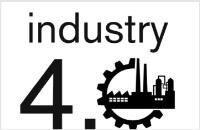 Add My Company
Add My Company
Sign In
What Is Industry 4.0?
05-10-2018

Lately, we’ve been hearing a lot of discussion about the Fourth Industrial Revolution, deemed Industry 4.0. However, we’ve also heard a lot of confusion over when the second and third industrial revolutions took place and what they entailed. Below, we’ve provided you with a brief explanation, so that when the buzzword inexplicably comes up in your next meeting you can jump right into the conversation.
A Brief History of The Industrial Revolutions
Not so long ago, in nineteenth-century England, the discovery of steam power and its mechanical use for factory production spurred the first industrial revolution. Nearly a century later (1850), the second industrial revolution took shape as electrical factories paved the way for assembly lines and mass production. Roughly a century after that (1950), early computer technologies and automation prompted the start of the third industrial revolution. Then, following the third wave, our pace quickened as the fourth industrial revolution began just thirty years later in 1980. However, it wasn’t until recently that efficient communication and data exchange provided us with a glimpse into the what the future of smart manufacturing and production could really entail.
So, what exactly is Industry 4.0?
The term refers to the increasing application of digital technologies in traditional manufacturing and industrial practices. Today, it’s all about digitization and creating smarter factories. Although the innovative technologies of Industry 4.0 are varied, the internet of things (IoT), big data, and cyber-physical systems will arguably make the greatest contribution. These three technologies allow machines to communicate with one another, exchange data, and improve efficiencies across the production chain. It’s predicted that these improvements in efficiency will lead to decreased transportation and communication costs and a subsequently lower cost of trade. This is especially promising for the UK as decreased trade costs could counteract potential trade barriers that may arise in the wake of Brexit. Industry 4.0 is also expected to infuse the British manufacturing sector with £455billion, which has the potential to drastically stimulate economic growth.
Is the UK ready for the transition?
Since the onset of the first industrial revolution, the UK has kept pace with the ever-evolving world of technology and experts predict that the fourth industrial revolution (Industry 4.0) will be no different. Currently, the UK is home to Europe’s largest Aerospace industry and strongest artificial intelligent machine learning market. By 2020, 85% of UK businesses are set to invest in artificial intelligence and machine learning.
While the increased adoption of machine learning and robotics have been largely feared by the workforce, these industrial digital technologies are set to create 175, 000 skilled jobs over the next ten years. Much like the industrial revolutions of the past, Industry 4.0 may eliminate existing jobs, but new jobs will arise in their place.
The thriving technological ecosystem in the UK is undeniable and could very well position us at the forefront of the fourth industrial revolution as long as our industries are fully prepared for the transition. You can find out more about how the manufacturing industry will be affected by Industry 4.0 in our next post!
For more information on What Is Industry 4.0? talk to KTR U.K. Ltd
Enquire Now
List your company on FindTheNeedle.

